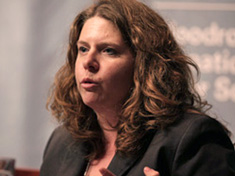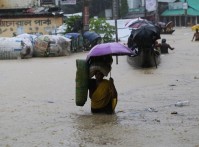-
Lisa Friedman: Bangladesh Shows Importance of Expanding Coverage of Climate-Induced Migration
July 19, 2013 By Jacob Glass
“What I found in Bangladesh was that [climate migration] wasn’t a straight line,” says Lisa Friedman in this week’s podcast. It’s “a far more complicated story.”
Friedman is the deputy director of ClimateWire, a news service that brings readers daily information related to climate change and its effects on business and society. At the launch of ECSP’s new report, Backdraft: The Conflict Potential of Climate Mitigation and Adaptation, Friedman discussed her experiences reporting on climate-induced migration in Bangladesh – one of the most vulnerable countries to climate change in the world, due to its low-lying geography, dense population, and high poverty levels.
“What I found in Bangladesh was that [climate migration] wasn’t a straight line,” says Lisa Friedman in this week’s podcast. It’s “a far more complicated story.”
Friedman is the deputy director of ClimateWire, a news service that brings readers daily information related to climate change and its effects on business and society. At the launch of ECSP’s new report, Backdraft: The Conflict Potential of Climate Mitigation and Adaptation, Friedman discussed her experiences reporting on climate-induced migration in Bangladesh – one of the most vulnerable countries to climate change in the world, due to its low-lying geography, dense population, and high poverty levels.
“One of the things that stood out to me in my reporting was my own bias,” she says. “The sexy story was the potential for transboundary conflict between countries, when a real issue within Bangladesh was the number of people having to leave coastal areas for cities.”
Although climate migration is often characterized as primarily involving the crossing of international borders – Bangladeshi migrants pouring into India, for example – internal movements within a country can strain already burdened infrastructure, give rise to urban slums, and increase the potential for domestic conflict.
“The challenge remains to explain to people not just the big stories – the potential for thousands of people to leave one country and go to another and the conflicts that might produce – but why does it matter to Ohio or any other place if people leave coastal areas in a desperately poor country and move to an urban area?” says Friedman. “This sort of internal migration is something that doesn’t get a lot of attention from the news media.”
Friedman spoke at the Wilson Center May 16.
Friday podcasts are also available for download from iTunes.
 A Publication of the Stimson Center.
A Publication of the Stimson Center.







